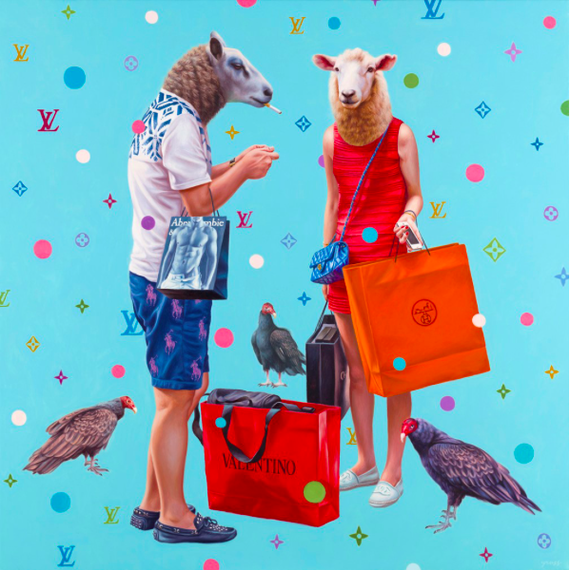
Gross has a sharp, satirical sense of who "we" are now, and Future Tense lays out his tainted vision with big-screen LCD clarity: he sees a tsunami of consumer culture that is drowning our collective soul in a sickly-sweet flood of lattes and Double Gulps. We are clones with phones, guarded by drones, grimly satisfied by the perks of consumerist culture and just distracted enough to avoid introspection and all its inconveniences.
Interested in our disinterest, Gross has a certain sense of humor about materialism's consolations and signifiers. One of his recent canvases, Narcissism, a mass-selfie that shows his own smug mug multiplied towards the horizon, staring outwards as he indulges while he can. It is a funny -- Hell, very funny -- painting that is both a confession and an unflinching rumination on the interminable, materialist present. God has blessed us with many fine brands, it seems to say, even when He is nowhere to be found and purgatory at least offers a cornucopia of fast food treats and all the latest Apple devices.
John Seed Interviews Alex Gross:
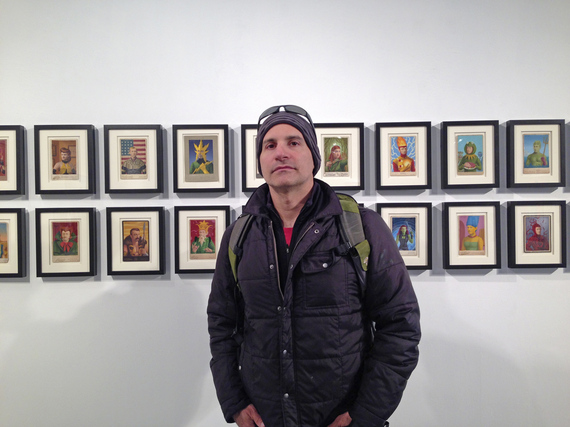
My childhood was pretty normal. I grew up on Long Island, in New York. We used to go to the Natural History Museum regularly with my school. I loved going there and seeing the dinosaurs, as well as all the stuff from ancient Egypt. At one point, the Tutankhamen exhibit came through New York and we saw that as well. My artistic passion as a kid was mostly centered around comic books. I read them constantly, and that's more or less where I learned to draw. I copied figures out of comics relentlessly. I would create my own comics, but usually run out of gas an hour or two after starting.
Around age 9, I saw Star Wars, and that also inspired me a great deal. I always loved science fiction prior to that, things like Planet of the Apes, which was always in reruns on television, and Star Trek. But Star Wars was a whole other level, and I bought all of the toys and action figures. But when it came to drawing, I was still most heavily influenced by comic books. I guess seeing another person's way of drawing that was so powerful and stylized really appealed to me, and made me want to try that myself. After Star Wars became a phenomenon, they came out with a book called The Art of Star Wars, and that was perhaps more influential on me than the film itself, just because it was full of amazing drawings and paintings. Throughout all of high school, I thought that I would probably end up being a professional comic book artist.
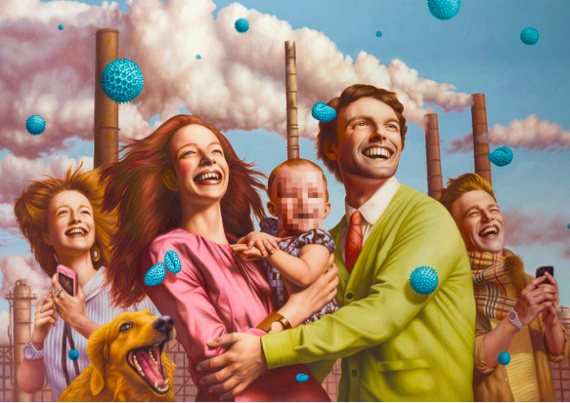
Art Center has two very separate departments, Fine Art and Illustration. I was an Illustration major, in spite of not really knowing what that was. But I suppose it sounded more practical, and I had an older brother who was just starting a career as a freelance photographer, so the idea of being some kind of commercial artist seemed doable, and appealing. Plus, at that point, I still thought I wanted to pursue doing comics. I was not particularly interested in Fine Art. Growing up, we visited the Metropolitan Museum of Art and MOMA often, so I had been exposed to plenty of world-class art, and I always preferred representational painting to anything else. And when I had visited Art Center, before applying, the most impressive work in the student gallery, to me, had been paintings by Illustration department students. The Fine Art department was not very interested in representational painting at that time.
At Art Center, the two departments had a strange relationship, something like stepbrothers who don't get along. Illustration students were required to take some fine art classes, with teachers from that department, who often resented having to teach us. At that time, the Illustration department was far bigger than the Fine Art department, and they depended on Illustration students to fill their class rosters. And then there was the Foundation department, whose classes we also took, and who had several faculty members that were fine artists too. But looking back on it now, and seeing how many successful fine artists have come out of the Illustration department, it seems pretty clear that it provided a well rounded education that covered both technical skill development and conceptual thinking. This was largely due to the Chairman of Illustration, Phil Hays, who had transformed the department in the mid seventies from one based solely on technique into one based on concepts as well as technique.
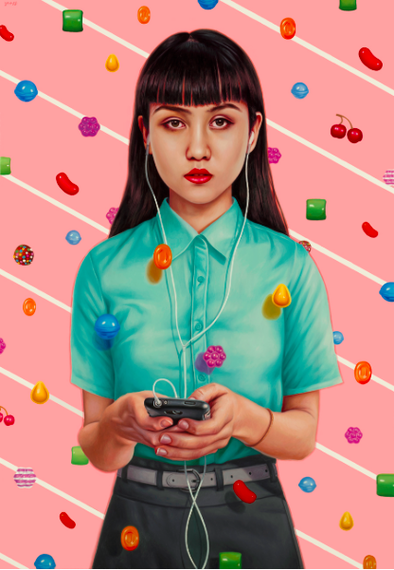
Experience, persistence and poverty, to name a few. Honestly, I only feel that it is in the last 5-10 years that my work finally reflects my feelings about the world around me. It took me quite awhile to figure out what I wanted to do and say in my work. And decades of practice with my tools, both digital and painting ones, have also helped me technically be able to accomplish what I want in creating an image, which is very important.
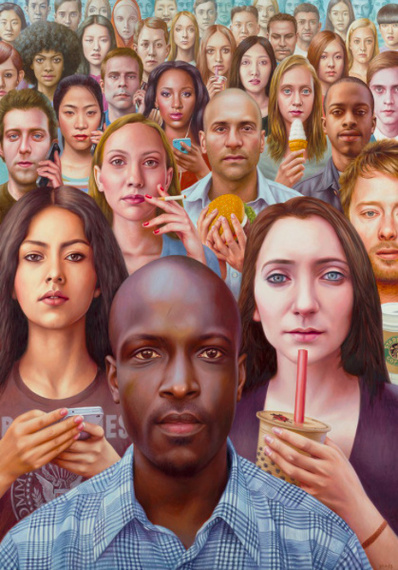
In her seminal book, No Logo, which dissects how and why the branding phenomenon has taken hold of our world, Naomi Klein wrote about some innovative and intrusive new ways that companies were foisting their brands upon regular citizens. What is truly astonishing, now that the book is already 15 years old, is how much of what she described has become commonplace. She wrote, "Calvin Klein stuck... perfume strips on the backs of Ticketmaster concert envelopes; and in some Scandinavian countries, you can get 'free' long-distance calls with ads cutting into your telephone conversations." Neither of these sounds nearly as disturbing as it did then, now that we are all accustomed to watching ads before videos on YouTube, or picking up the LA Times, and finding the entire front page is actually an advertisement. We have gone so far, so quickly, it's frightening.
My generation, people born from the mid sixties to the mid seventies, has a unique perspective on the world as it stands today. We are old enough to have been adults for awhile before there was an internet, or cell phones, and perhaps even before computers were a necessity. But we are also young enough to have adapted to the many technological and 'lifestyle' changes that these things have brought, and even embrace some of them.
The same can be said for the parabolic rate of increase of branding that has occurred since I was a child to now. Our generation grew up in a world where most companies still sold (and made) products rather than brands. Ballpark names did not feature names of corporations. Of course, everything is changed now. Younger generations have grown up in a world where everything is sponsored, and all brands promote "lifestyles," and they have never known another way. Ask a 25-year-old what selling out is, and see if they can come up with an answer. For my generation, it might have been a late night talk show host doing a credit card commercial, or a musician being paid to mention brand name items on her album. But that doesn't seem to bother most kids anymore.
I think this gives me an interesting ability to view this stuff both from afar, and from within. It's a fascinating subject for me. I often get the feeling that all technology has been developed or at least directed with the sole aim of promoting consumption and spending.
Ultimately, what I see nearly everywhere, are "de-sensitized denizens of consumerist culture," as you so aptly put it. And I am trying hard not to become one myself, or raise one in the future. And I fear that I am fighting a losing battle.
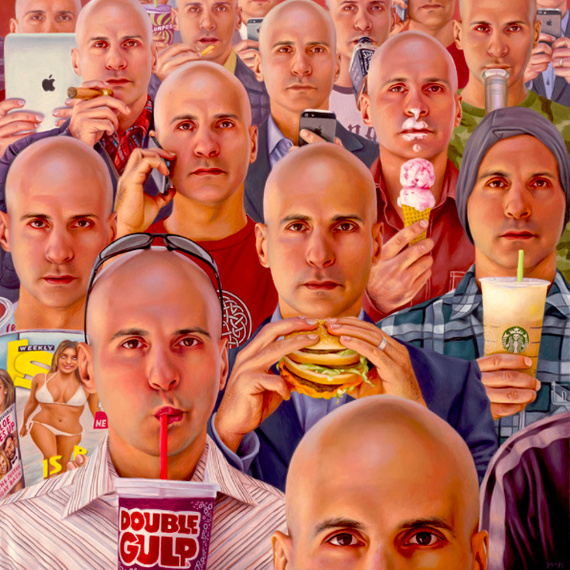
What preceded Narcissism, was another piece entitled Distractions. It's a similar image, except that in Distractions there are a multitude of different men and women, mostly holding either food, drinks, phones or cigarettes. Narcissism is an extension of this idea, except all the subjects became me. In the piece, I am eating a burger, reading a tabloid mag, eating ice cream, texting, talking on the phone, drinking a double gulp, a Starbucks, etc. Just generally consuming things, like many of us do.
Once, about four years ago, at one of my exhibitions, someone looking at a piece I had done with zombie-like people staring at iPhones, said to me, "So you obviously don't have an iPhone, right?" When I told her that in fact I do have an iPhone, the look of disappointment on her face was unmistakable.
I get this from time to time: people think that because in my work I am looking critically at aspects of our current popular culture and lifestyle, that I am somehow above it or better than it. I am not. Although I try not to walk around staring at my phone, and I try not to watch ads or television commercials, I am still living in the same world as everyone else, and I am not immune to the overwhelming power of technology, social media, and most of all branding. So, I feel that it is important to also turn the lens on myself from time to time, as unpleasant as that may be. I suppose if Narcissism were more personally accurate, instead of a burger it would be a salad, and instead of the Double Gulp, it would be a Konbucha, because I don't really eat junk food. But that would be more about 'me' and less about 'us.'
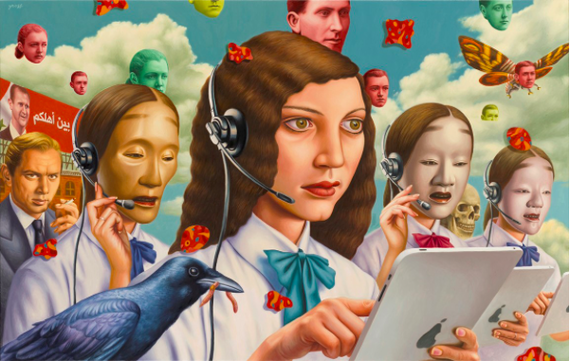
That's a completely subjective statement, but yes, it is fair to say. There is no question that I am not optimistic about things in America, or on Earth right now. But I would say that I am a realist, more than a cynic, or a pessimist.
When I hear a musician or a comedian expressing similar views to mine, it makes me feel that I am not alone in feeling this way, and that maybe there are others out there who also connect with these thoughts. And, in fact, there are many of us! Although these ideas can be depressing, such as the knowledge that our own government has, for years, been illegally spying on all of us, I find it helpful to know that there are many others out there who are unhappy about this and who also feel powerless to do anything about it. By expressing some of these critical ideas in my work, I think that many viewers find a strong connection to their own feelings about things, and take strength from it, rather than finding it overly negative.
Incorporating humor into some of the work perhaps makes it more palatable, less heavy-handed and as you say, balances some of the unpleasant ideas. It's hard not to have a sense of humor about these things. I think it's the only way for many of us to stay sane.
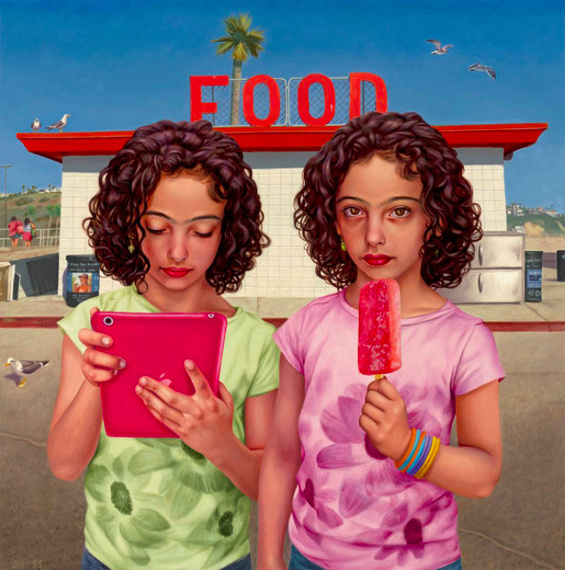
I'm passionate about all of the things we've been discussing today. Most of them have to do with the fact that things are very messed up right now, and getting worse. I'm passionate when someone like Adbusters gets out there and tries to raise awareness and inspire people to take action to make change. I'm passionate when I read about Edward Snowden and just how much he has sacrificed for the rest of mankind. I'm inspired now by the student protests continuing in Hong Kong. These are the things I am most passionate about today. And I'm also passionate about the new AT&T family plan for talk and text!*
*(This sentence sponsored by AT&T)
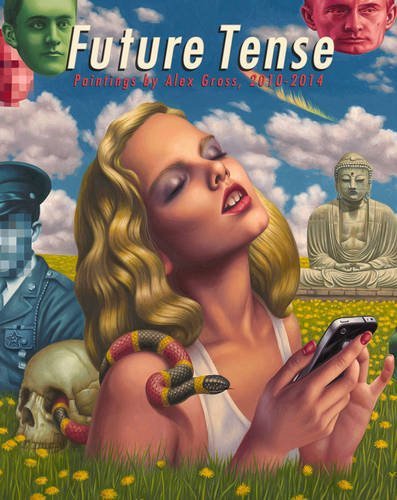
Anything else worth mentioning?
I have a new book that I hope people will check out. It's called Future Tense, sharing that title with my current gallery exhibition in New York, at the Jonathan LeVine Gallery. The new book features paintings that I have done over the last four and a half years, and includes some of the new work, though not all. I don't want to sound purely self-promotional, but the book was a lot of work, and I am happy with how it's turned out, and I hope that folks who are interested in my work might check it out.
Alex Gross: Future Tense
October 8, November 9, 2014
Jonathan LeVine Gallery
557C West 23rd Street New York, NY 10011
Work by Alex Gross is also on view in:
Masterworks: Defining A New Narrative
The Long Beach Museum of Art
October 23, 2014 - February 1, 2015
